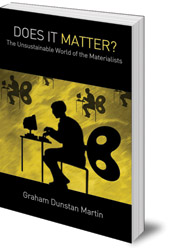Quick Look
Draws on quantum physics, cosmology, artificial intelligence, brain science, biology, mysticism and philosophy to ask, does materialism make sense?
Description
Materialists claim that the mind, consciousness, life, evolution and the universe can be explained as the purposeless dance of unconscious particles, governed by chance. This books asks, does materialism make sense?
Graham Dunstan Martin delves into areas as diverse as quantum physics, cosmology, artificial intelligence, brain science, biology, mysticism and philosophy, to assess the probabilities that the materialists are right. Are we, he asks, living souls? Does our universe in fact have a Designer?
He concludes that computers will never become conscious; that the mind is not the same as the brain; that we genuinely and creatively possess free will; and that our experience of diverse levels of consciousness simply cannot be explained by materialism.
This book is for all enquiring minds who are dissatisfied with the current reigning creed.
Table of Contents
Introduction
1. Can Computers be Conscious?
2. Robots and Zombies
3. The Symphony of Consciousness
4. Can Brains Think?
5. Free Will
6. Why is One Better than Two?
7. Idealism and the Creative Power of the Mind
8. Consciousness and Quantum Theory
9. Where is Consciousness Located?
10. Design
11. Creation and Eternity
12. Scientists of the Soul
Conclusion
Reviews
'A fine book ... Martin has that rare gift of explaining complex issues with clarity and insight. This one is about materialism and mind. The book is called Does It Matter? And it does.'
-- Alexander McCall Smith, The Herald, December 2005, 'Books of the Year'
Joint-winner of the Scientific & Medical Network 2005 Book Prize
'Graham Martin sets out a most powerful case ... subtle and profound.'
-- Max Payne, Scientific & Medical Network Review, Spring 2006
'Readers will...recognize that Martin is a lively, lucid writer, and shuns reverberative formulations. Neither in arguing the theories he advances, nor in his expositions of Neurology, Religion and Quantum Physics, is there any lack of detail or clarity.'
--Robert. R. Calder, Popmatters.com
'This book is written for the general reader in a clear and lively style. [...] The great merits of this book are its clarity, the breadth of material employed, and its undermining of materialist reductionism by use of the very natural science of which it claims to spokesman and only valid interpreter.'
-- R. T. Allen, Appraisal magazine, March 2006
'This book gives a witty and perceptive account of the deficiencies behind the scientific belief in materialism. Graham Martin examines with laser accuracy the weakness of current mechanistic views -- the brain as a computer, the absence of free will, the belief that consciousness must only arise from, and be limited to, brain processes. In an intelligent and persuasive way he shows how consciousness must lie outside the brain and be part of the fundamental structure of the universe. This book is packed with references, humour and insight and should be part of every thinking layperson's library.'
-- Dr Peter Fenwick, neuropsychiatrist
'Graham Martin’s beautifully written and lucidly argued book is a brilliant critique of materialist accounts of the universe and of the place of consciousness in it. Although I could not accept his positive doctrines about consciousness as the source of creation and his case for Intelligent Design, I was inspired by his unanswerable attack on what Daniel Dennett has described as ‘the current orthodoxy’. It has opened a new thinking space for serious philosophers and cleared the way for speculations beyond the emptiness of mechanistic thought that has bred such monsters as evolutionary psychology and other manifestations of scientism.'
-- Professor Raymond Tallis, Philosopher, and Professor of Geriatric Medicine, University of Manchester
'An impassioned and often entertaining exploration of an impressive array of topics … Graham Dunstan Martin is to be congratulated for bringing together arguments and evidence that challenge materialist presuppositions in a lively and accessible fashion, and also for introducing readers to some fantastic but perhaps worthwhile theories along the way.'
-- Paul Marshall, Journal of Consciousness Studies, 14, no. 4, 2007
'The strength of this book lies in the many cogent reasons - some well known, some quite novel and ingenious - to dismiss materialistic accounts of life, the universe, and everything.'
-- U Mohrhoff, AntiMatters Journal
'All in all the author has written a rich and fruitful book which makes you think … Materialism is really no longer a serious philosophy, and the more people who realize that the better.'
-- Titus Rivas, Terugkeer
Author
Graham Dunstan Martin was born in Leeds, England, in 1932. He taught French and English in schools for several years before lecturing in French poetry, literature and philosophy at the University of Edinburgh from 1965 to 2000. He is the author of many books, including Shadows in the Cave: Mapping the Conscious Universe (1990), two novels for children, four fantasy novels for adults, translations of French poetry and three works of literary criticism.
Links
Also by Graham Dunstan Martin:
Living On Purpose

